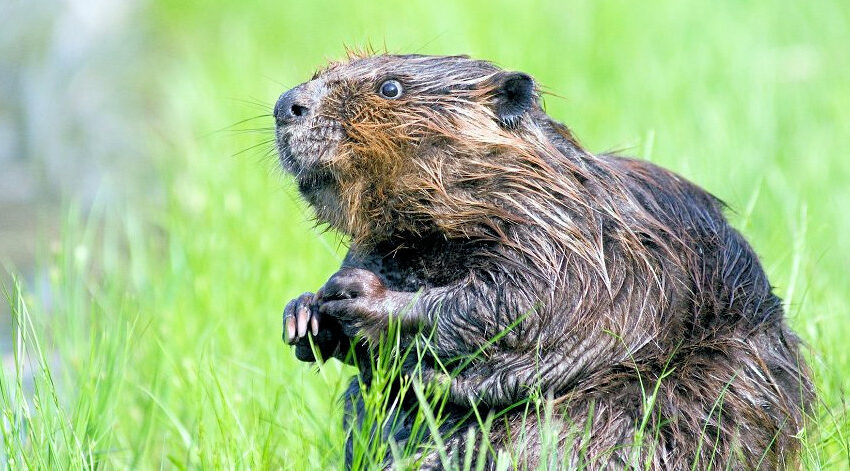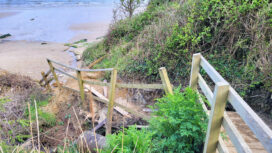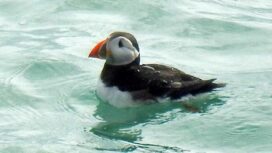Beavers could be brought back to live in the Isle of Purbeck in Dorset within months for the first time in 400 years following expert evidence which has been presented to MPs at the Palace of Westminster.
The National Trust is only waiting for the government licence to allow it to release the rodents into Little Sea at Studland – a scenario which has just taken a big step further forward to becoming reality.
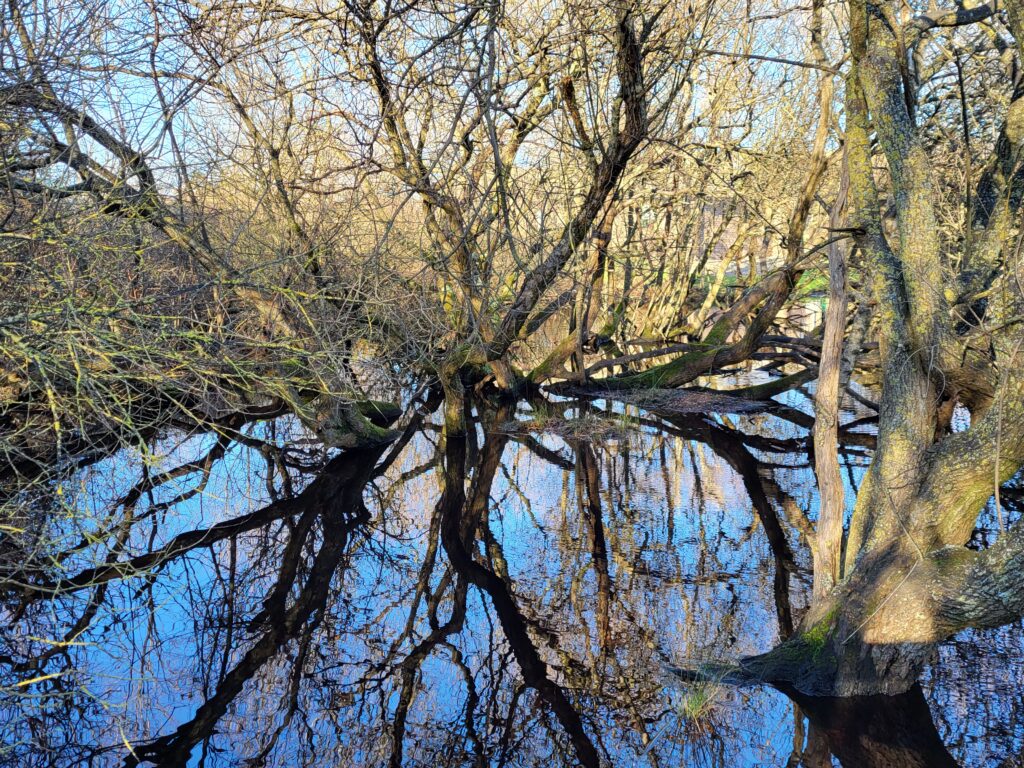
A Studland pond close to Little Sea which will be ideal habitat for beavers
Hunted to extinction for meat and fur
On Tuesday 31st January 2023, a Department for the Environment, Food and Rural Affairs (Defra) committee was told that a government strategy was needed urgently so that licences could be granted for schemes to benefit the environment.
A taskforce to take the next steps may now be established to set up a free national database to gather information on where animals, birds, insects and plants have already been introduced, and the benefits and risks which that entails.
The committee also heard that environmental land management schemes (ELMS) could be used to make grants available for farmers and landowners to make space for water and nature on their land.
Exeter University professor Richard Brazier, who has led studies into reintroducing beavers to Purbeck, told the Defra meeting that putting beavers back into the wild would have huge benefits for the environment.
Although hunted to extinction for their fur, meat and scent glands, beavers used to play a large part in managing the countryside, creating natural wetlands which are home to a large variety of wildlife, including bats, dragonflies, kingfishers, owls, moorhens and woodpeckers.
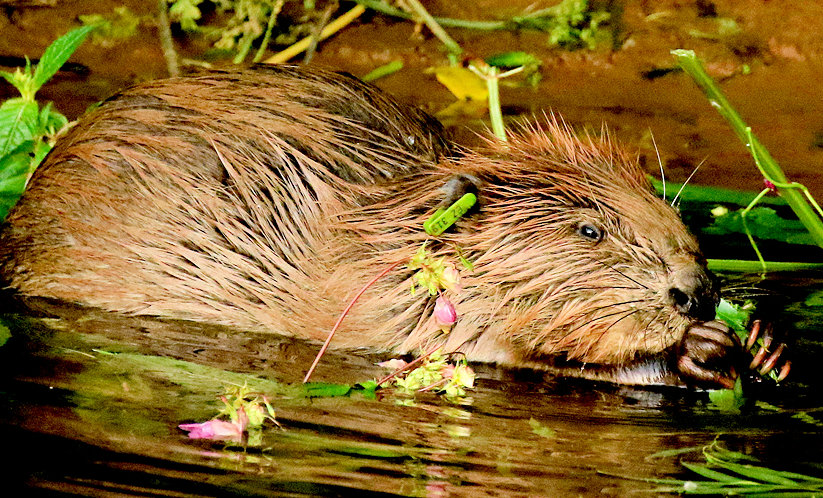
A beaver from the River Otter trial gets to grips with his new home
Water voles flourished living alongside beavers
The committee, which will decide whether it is appropriate to reintroduce extinct species to the British countryside, heard that a trial scheme to bring beavers back into Devon may also end up saving one of Britain’s most loved and threatened creatures – the beloved water vole, Ratty from The Wind in the Willows.
Professor Richard Brazier told the committee:
“The environmental consequences for the water vole have been massive. In the River Otter, when the beavers started to make the floodplain full of water again we found that mink, which have almost wiped out the water vole population, were not so able to predate.
“The water voles flourished by living alongside the beavers, and that was a really unexpected benefit that gave us hope for the recovery of the water vole which is sadly soon to be lost from these shores if we are not careful.
“You would still need to control the mink, but it gives you a means to start to recover one species by reintroducing another; probably more cost effective than culling the mink, which isn’t easily done.”
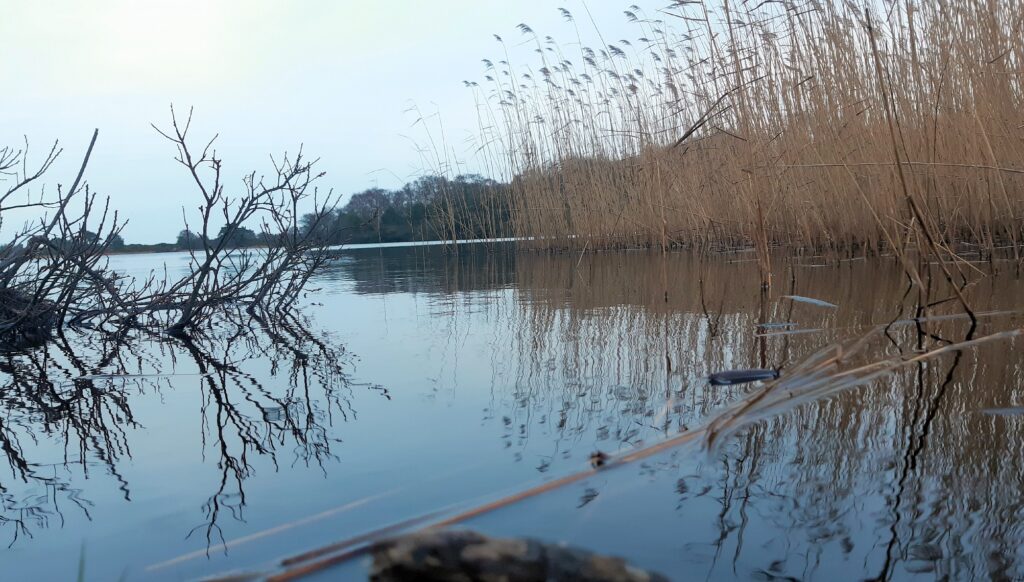
A beaver’s eye view of the lake at Little Sea, Studland, which will be their new home
Purbeck would be first to see an open release
Once a strategy to allow and manage species like beavers back into England is formulated, which could be done in a matter of months, the National Trust in Purbeck is ready to go ahead with plans to reintroduce the animals at Little Sea in Studland.
Previous beaver releases in England have always been tightly managed so that in theory the beavers couldn’t escape into the wild – but Purbeck’s plan would be the first to allow an open release and let the beavers go where they wanted.
But the land chosen at Little Sea is a geographically enclosed area, with sea on one side and dry heaths on the other, both of which are inhospitable conditions for beavers and should act as natural barriers.
By beginning on a smaller scale, the project can adapt and have exit strategies should it need them, but eventually it could spread out to more of Purbeck Heath’s 3,330 hectare national nature reserve.
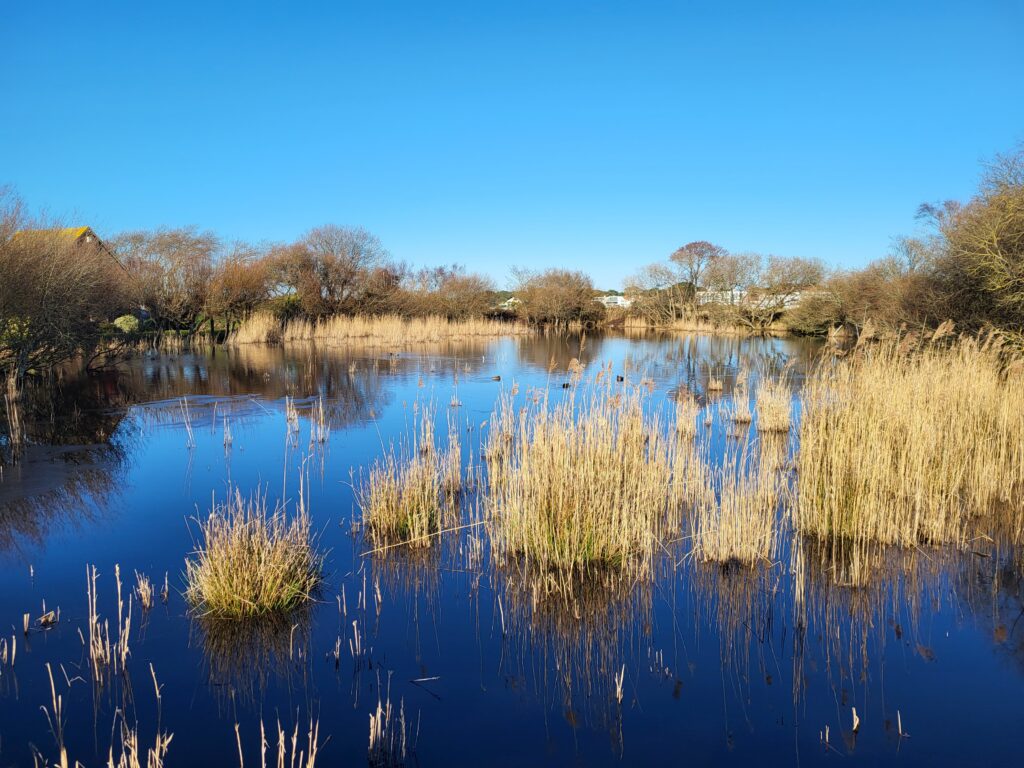
Beavers will bring benefits for biodiversity and water quality to Studland
Support from many wanting beavers back in Purbeck
National Trust land and nature programme manager for the Isle of Purbeck, David Brown said:
“The National Trust is still working to bring beavers back to Purbeck, starting at Little Sea, Studland.
“Over the past two years we have worked with Professor Richard Brazier and his team from Exeter University to carry out detailed feasibility studies and have worked with local landowners to produce a beaver management plan, which we are very confident will make beavers work for everyone locally.
“They will bring benefits for biodiversity, water quality and flood protection where they can, but we will also make sure they don’t settle and cause negative impacts where people don’t want them.
“Last year the government reclassified beaver as a native species and introduced the legislation that paves the way for beavers to be released back into the wild. However, they still haven’t yet agreed the criteria for issuing licences for new projects such as ours.
“We’re optimistic this will happen soon, and we are already working with Natural England’s licensing team to make sure our project preparations meet all the necessary requirements for a successful introduction.
“We have already received support from many local people wanting to see beavers back in Purbeck, and we are hopeful this will become a reality in 2023.”
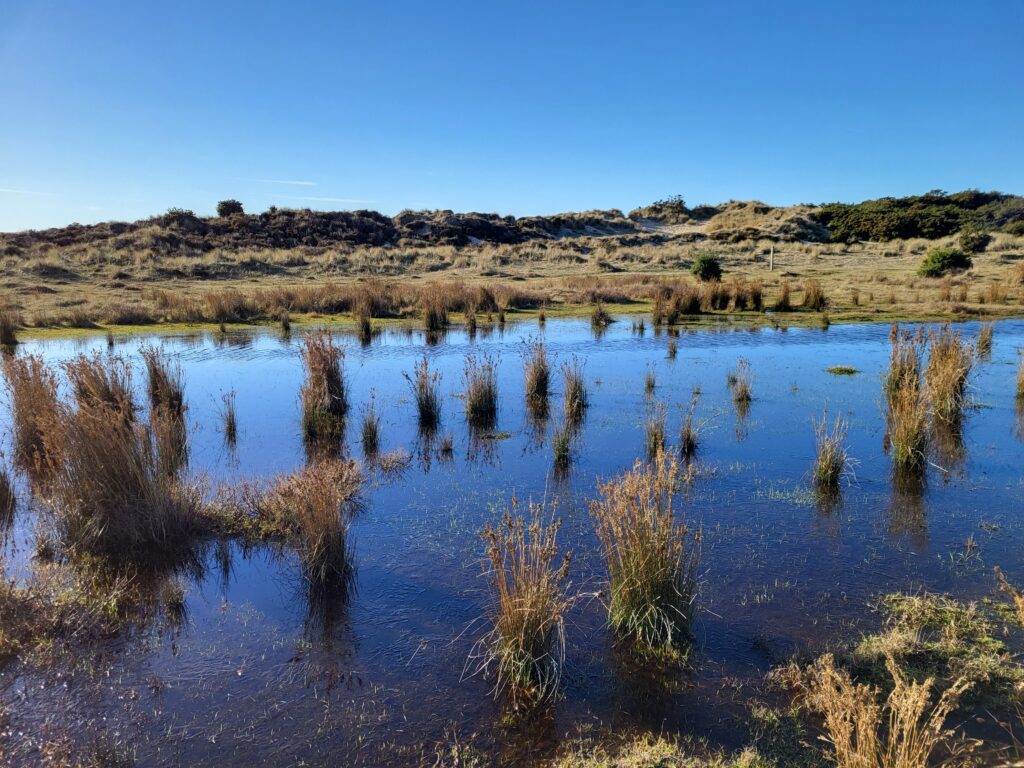
There are plenty of small fresh water lakes on the Studland peninsula
90 percent of wetlands lost in 100 years
Eurasian beavers are semi aquatic mammals which were once native to the UK, but were hunted for their scent sacs, fur and meat until they vanished from the country’s waterways.
At the start of the 20th Century, there were only around 1,200 beavers surviving in Europe but today, beavers are slowly returning and the latest reintroduction planned by the National Trust for the Isle of Purbeck is ready to go as soon as the government issues licences.
Around 90 percent of the UK’s wetlands have been lost in the last 100 years. Beavers create these marshy areas which increases the biodiversity by benefiting other species like frogs, toads, newts, insects and plants that sustain animals higher up the food chain.
Crucially, wetlands also absorb the greenhouse gas carbon dioxide from the atmosphere and lock it away underground.

Professor Richard Brazier gives evidence to the Defra committee
National strategy is urgently needed
Professor Richard Brazier told the Defra committee:
“There isn’t a national strategy in England for beaver reintroduction – unfortunately we have been waiting for this since the end of the River Otter beaver trials in April 2020.
“With national strategy comes a coherence and understanding for farmers and landowners about what it means to accept animals onto their land or not. Without that national strategy we are in a vacuum and can’t move forwards.
“In the meantime, as very mobile animals do, beavers are moving from one catchment area to another and that isn’t being regulated.
“We need a strategy not just to reintroduce beavers but also for a whole host of species that can do this country and its natural habitat a lot of good – that has to be top of the list.
“Then you would find with appropriate ELMS payments to farmers to benefit from beavers occupying their streams and rivers that it wouldn’t be too much of a problem.”
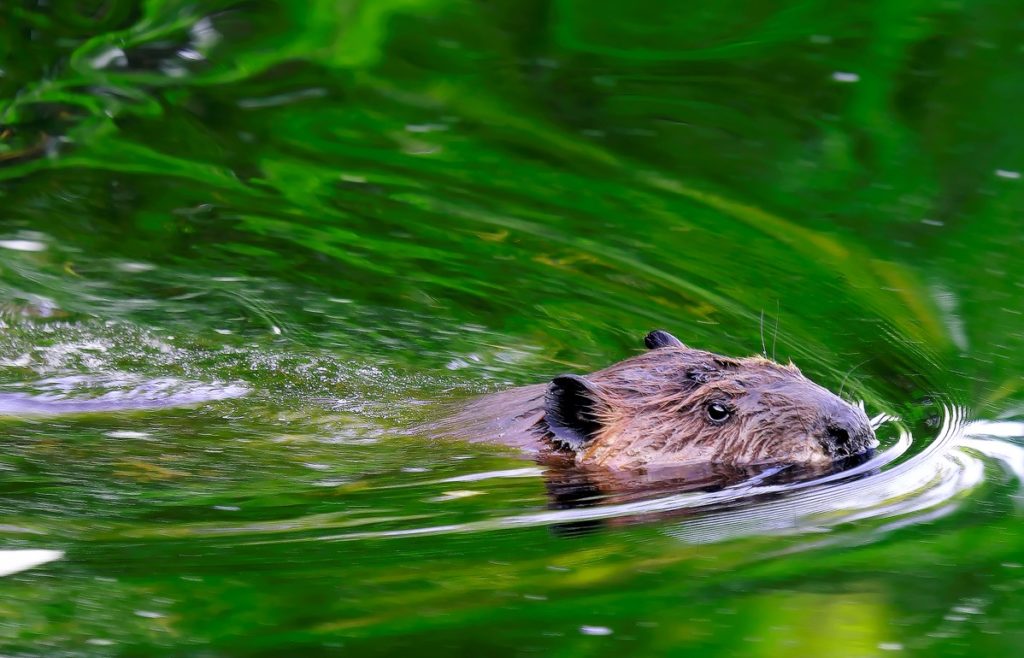
Beavers may be settling in to the Studland peninsula by the end of 2023
“You are always looking to avoid conflict”
Professor Richard Brazier added:
“We call the Eurasian beaver a keystone species and by that we mean one which manipulates the environment to its own advantage, but in doing so also does a whole lot of good for other species, including humans.
“Because it was removed from our ecosystems – hunted to extinction 400 years ago – we lost the way it helps to manage our landscape. We lost our wetlands and in fact we speeded up the loss by draining them for agriculture.
“When we lose lots of water, especially in a drying climate, we lose life. The beaver is very important in maintaining a balance in a natural ecosystem – we see how important it is to bring them back now, and we see how important the beaver is to a natural environment.
“But if beavers build dams and push water sideways onto flood plains where there is, for example, rail track infrastructure or a power station, you would cause a lot of conflict straight away.
“You are looking for the benefits that beavers can bring to a landscape, but always looking to avoid conflict.
“The vast majority of people have been overwhelmingly positive, which was something which really surprised us. We ran a survey and well over 95 percent of 3,000 respondents were very positive about the reintroduction of beavers.
“In the Otter Valley, we had beavers building their dams in places which weren’t ideal and flooding a few farmers’ fields and their initial response was negative, but we worked with them to mitigate the problems and they generally changed their minds about the beavers afterwards.”
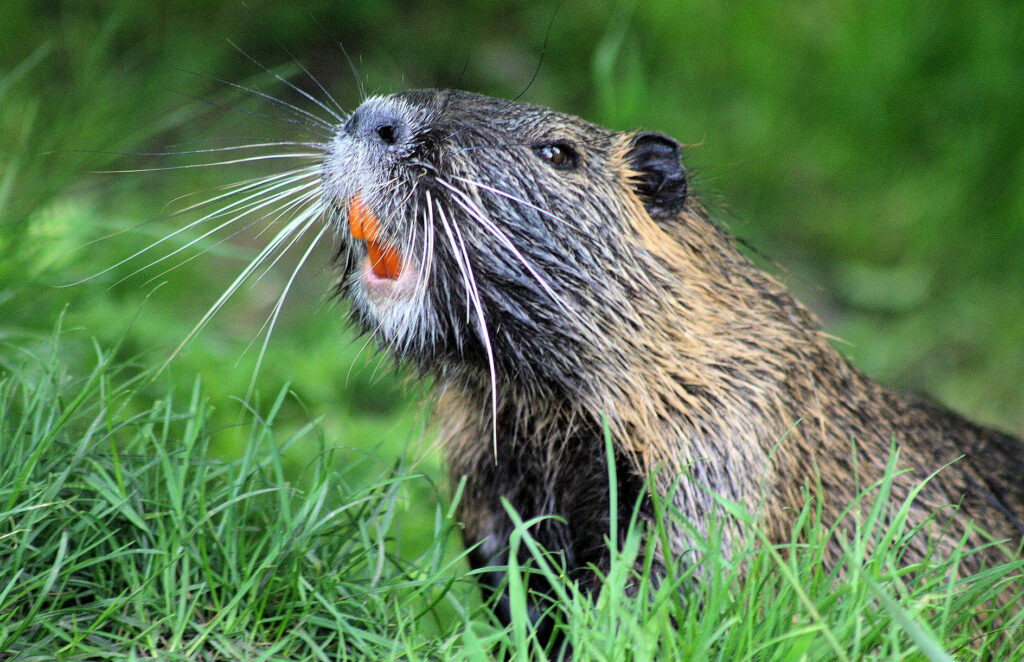
Beavers’ teeth are orange because of the iron content in the food they eat
Beaver facts
- Beavers are the world’s second-largest living rodent after the capybara.
- They are herbivores, eating aquatic plants, grasses, herbaceous plants and shrubs in the summer months and woody plants in the winter.
- They will often store food underwater so they can access it if the water freezes over in winter.
- They can remain underwater for up to 15 minutes.
- They have protective eyelids to see underwater and can close both their nostrils and ears to prevent water from entering.
- Beaver teeth are orange from the iron content in the food they eat.
